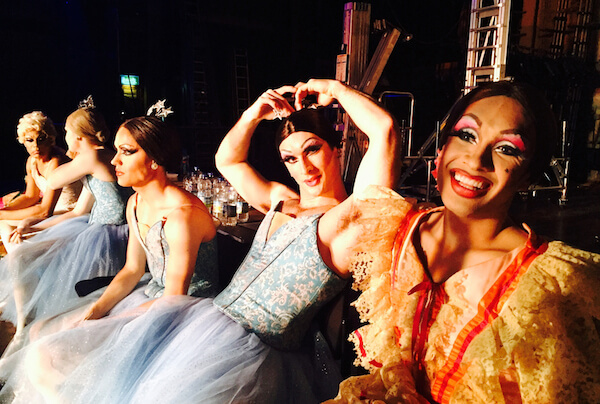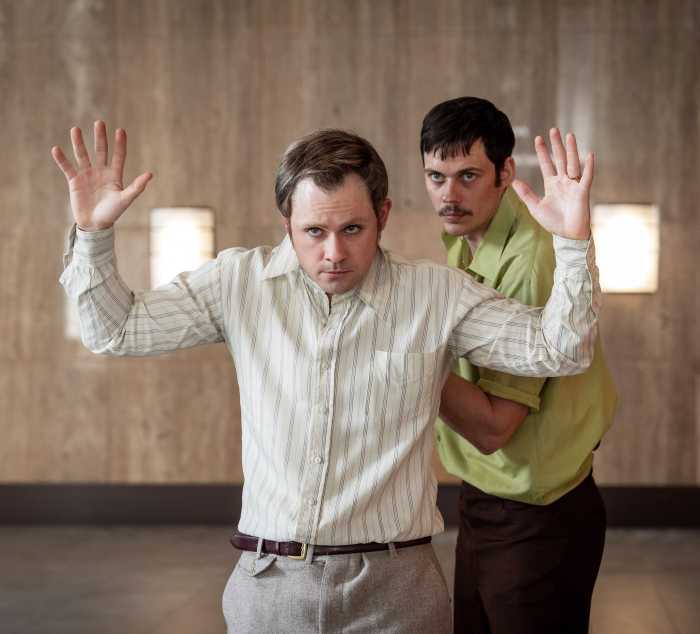Les Ballets Trockadero de Monte Carlo dancers Robert Carter, Philip Martin-Nielson, Chase Johnsey, Laszlo Major, and Chris Ouellette. | ICARUS FILMS
The all-male drag ballet company Les Ballets Trockadero de Monte Carlo has been performing its singular mix of high art and high camp for 40 years. Bobbi Jo Hart’s celebratory documentary “Rebels on Pointe” showcases the Trocks, which bills itself as the world’s foremost all-male comic ballet company, by capturing the dancers and artistic director Tory Dubrin onstage and behind the scenes. No one will be left in doubt about the transformative power of their performances.
At an amusing and poignant moment in the film, Raffaele Morra does a very funny turn as an aging diva, whose tutu sheds feathers as he dances on stage. It’s a clever bit of comedy, but it underscores how limited the lifespan of a dancer’s career is.
“You cannot dance forever,” Morra explains, noting how hard dancers fight from a young age to secure a spot in a company. But, even as a principal dancer, they are often forced to retire at 40.
Bobbi Jo Hart lovingly introduces us to ballet’s unparalleled Trocks
“Rebels on Pointe” shows how the Trocks created a safe space for dancers like Morra, as well other members of the company. Carlos Hopuy, from Cuba, was too short to dance in his country’s National Ballet but he found a home with the Trocks. He also found a husband. All of the performers in the troupe are gay, and one of the film’s best anecdotes has dancer Chase Johnsey recounting his coming out story.
One resonant moment in the film has out gay American Ballet Theatre principal dancer James Whiteside confessing his jealousy of the Trocks. He often plays the Prince in ABT productions and bemoans how, “counter to my nature,” he must feign love for a woman on stage. (Whiteside does dance in drag as part of the troupe the Dairy Queens).
But Dubrin insists that the Trocks is not simply a gay company. Rather, the troupe uses drag and all gay performers to expose audiences to a gay sensibility. Audiences around the world, especially in Japan, flock to the Trocks in droves. Their fans also include children. The troupe has come a long way since its early performances in a second-floor loft space at 14th Street and Ninth Avenue, at a time when it was ignored by funding sources. Over the years, the troupe has experienced joyous moments — three pairs of dancers in the company are married — and bleak times, with the loss of many members to AIDS during the height of the epidemic.
“Rebels on Pointe,” however, is mostly focused on the dancing. The stamina needed to execute the moves they do on stage is not just a question of male dancers performing “on pointe,” they also need to amplify their movements for comic effect. Classic ballet techniques must be learned and then mocked in ways accessible and funny to audiences, something that requires a very delicate balance. The dancers pay homage to the Ballet Russe de Monte Carlo, but they also have silly drag names like Yakatarina Verbosovich and Nadia Doumiafeyva.
The camaraderie among the men is what makes the film so affecting. The dancers have created a family atmosphere and really care about one another. The film also emphasizes the bonds they have with their original families. Dancer Robert “Bobby” Carter, who joined the Trocks in 1995, effusively rcalls telling his mother he got a job as a dancer, but sounds particularly proud — becoming teary-eyed — in recounting that he could earn enough money to bring his parents to New York to see him perform.
Morra has several touching scenes caring for his ailing father, while Hopuy enjoys having his mother, a former dancer who trained him, backstage as he is putting on his makeup. She voices pride at how much he resembles her.
“Rebels on Pointe” is inspiring not just because of its heartfelt stories and subjects. The film also works to remove the stigma about men dancing, men in drag, and men breaking out of masculine codes of behavior. These men are empowered by their belief in themselves for dancing as well as they do and in drag. Hart’s doc may be very much like a 90-minute commercial for the company, but it will prompt fans old and new to seek out a performance by the troupe at first opportunity.
REBELS ON POINTE | Directed by Bobbi Jo Hart | Icarus Films | Opens Nov. 15 | Quad Cinema, 34 W. 13th St. | quadcinema.com





































